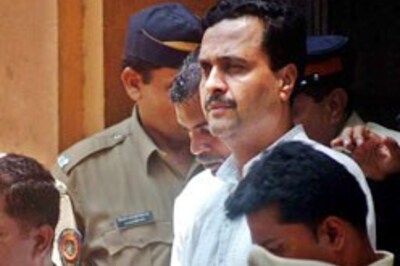
views
The flip-flop was quintessential Kanshi Ram. Few Indian politicians have mastered the art of political unpredictability in the manner that the BSP chieftain routinely did. It was a deliberate strategy, designed to create a constant state of political instability. His critics saw it as rank opportunism, his supporters saw it as an instrument of backward caste assertion. Kanshi Ram's own explanation was more prosaic: political flux was necessary for him to wield the "master key" that would unlock the gates of power.
In that sense, Kanshi Ram was remarkably different to any Dalit politician before or since. Until his arrival, Dalit politics was shaped by two dominant strands. The first was the politics of the early Ambedkarites, who saw education and agitation as their vehicle to upward mobility. The Dalit Panthers were perhaps the most articulate exponents of this political trajectory, their rebelliousness being couched in powerful literature and street- fighting tactics. It was ideologically appealing, but politically limiting. The second group of Dalit leaders were those who were co-opted by the upper castes, politicians who remained within the paternalistic Congress umbrella. Jagjivan Ram was a classic example of this tradition which has stretched right down to a Sushil Kumar Shinde, now seen as a front-runner for presidency next year, simply because he is a Dalit.
Kanshi Ram changed the grammar of Dalit-bahujan politics. He took it out of the lofty Ambedkar seminar circuit and the comfort of the Congress elite by giving it a ruthless streak of realpolitik. He was an organizer par excellence and built large associations of the bahujan samaj such as DS4 and BAMCEF before founding the Bahujan Samaj Party in 1984. His goal was clear: he wanted the political pyramid to be horizontal not vertical, one in which the Bahujan Samaj would share power, not simply be benign supporters of the prevailing ruling order. His most famous slogan "tilak, taraju aur talwar, inko maaro joote char" reflected his core philosophy of creating a state of permanent caste antagonisms in which his supporters would look the upper caste "enemy" in the eye. Not for him the ritual deification of Ambedkar by building statues and renaming universities. Nor the persistent demand for increased reservations that seemed to be the calling card for all other Dalit-bahujan politicians. As he put it, "reservation is a crutch, useful for a cripple, but a positive handicap for someone who wants to run on his own two feet."
His sartorial preferences reflected the man's persona. Not for him the jacket and tie respectability that Dalit intellectuals seemed to take pride in. Instead, with a towel around his neck, a loosely buttoned, crumpled shirt and chappals, Kanshi Ram was a man determined to defy the established norms by positioning himself as a combative, plainspeaking often dictatorial messiah of the marginalised. He lacked the easy charm of a Laloo (recall his shameful behaviour in attacking journalists outside his house), he didn't have the demagoguery of a Vajpayee (a Kanshi Ram speech was an exercise in incoherence), and yet, he must rank with the Laloo-Vajpayee duo as the foremost mass politician of the last decade. A party of dalits and backwards is now perhaps the number one party in Uttar Pradesh. Kanshi Ram's dream of being a "ticket giver" has been realized. BSP voter mobilization has been a triumph of the secretive silent and formidably organised BSP cadres. All these facts are a tribute to the powerful base of support that Kanshi Ram was able to build and organize. The early years of the BSP were full of setbacks, electoral gains were small, through it all Kanshi Ram soldiered on. Looking at the power of the BSP today it is easy to forget from where this party has come, from the lowly wretched beginnings it clawed its way to the top of the morass of caste-dominated UP.
And yet, for all his achievements, Kanshi Ram's legacy remains deeply flawed. It is one thing to make social exclusion the basis for a political identity; it is quite another to use that sense of grievance and anger to build a personal empire. Unfortunately, that's exactly what Kanshi Ram and, more particularly, his chosen successor Mayawati have ended up doing. Palatial party offices, opulent residences and acres of farm land: it would seem that those who claimed to represent the interests of the poor and backwards have merely piggybacked on them to accumulate their own treasure chest. Tickets being auctioned to the highest bidder, the Bahujan Samaj party appears to have become a political casino where social justice and even caste affiliations must take second place to the colour of money (note the number of wealthy Brahmins who are now BSP ticket-seekers).
Mayawati's supporters have argued that the serious charges of disproportionate assets - running into several hundred crores according to documents placed by the CBI in the Supreme court - are an "upper caste" conspiracy. How different is their Bahenji's case from the slew of upper caste politicians who have accumulated even more unaccounted wealth, runs the argument. Why doesn't the media shriek when Mayawati's rivals design Grecian bungalows littered with gold and illuminated marble? Why is Mayawati's birthday bash singled out for a public outcry while politicians who book an entire hotel for their children's birthday are simply winked at? If the others can do it, why can't our leader, is the conclusion.
Persuasive arguments, imperfect conclusion. A system steeped in corruption cannot be a justification for individual self-aggrandisement. Moreover, it reveals the basic flaw in the mental make up of the so-called socio-political revolutionaries of the Mandal movement. Whenever put to the test and their failings exposed, their sole defence is to blame their misfortune on class and caste bias. The long-suffering Dalit-bahujan as "victim" of an inherently unjust system is an attractive ideological construct (and also not untrue), but unfortunately its one that has been used much too often now to rationalize the worst exhibitions of political immorality. Then whether its Laloo's fodder scam or Mayawati's Taj Corridor case, the Mandal leaders and their fellow-travellers have always attempted to make caste hatred the basis for their predicament.
The tragedy is that the real victims of caste bias and hatred is not the political leadership of the dalit-bahujan samaj, but its vast multitudes. Travel to any Mayawati rally in the heart of Uttar Pradesh, and the spontaneous support that the charismatic Empress of the BSP evokes is quite astonishing. In this age when political parties struggle to gather crowds, Mayawati can draw thousands of admirers without having to pay for the bus ride. In their eyes, one senses hope, a belief that somehow their leader will deliver them from their life of deprivation.
This sense of hope has been interpreted by the BSP's ideological supporters as a sign of a new voice, a genuine empowerment of those who were discriminated against for centuries. The fact though is that the voices have a false ring to them, the hopeful eyes are only witnessing a political charade being played out at their expense, one in which the only real beneficiaries are the rabble-rousing leaders. For parties like the BSP, the voters have become only a fertile catchment area, not a robust coming of age of a new order. To that extent, politicians like Kanshi Ram and Mayawati represent the strengths and the limitations of identity politics. What perhaps started off as a genuine movement for empowerment of the Bahujan Samaj has ended up as a palace coup which has struggled to go beyond Uttar Pradesh . And that's a real pity. About the AuthorRajdeep Sardesai Rajdeep Sardesai was the Editor-in-Chief, IBN18 Network, that includes CNN-IBN, IBN 7 and IBN Lokmat. He has covered some of the biggest stories in I...Read Morefirst published:October 14, 2006, 12:11 ISTlast updated:October 14, 2006, 12:11 IST
window._taboola = window._taboola || [];_taboola.push({mode: 'thumbnails-mid-article',container: 'taboola-mid-article-thumbnails',placement: 'Mid Article Thumbnails',target_type: 'mix'});
let eventFire = false;
window.addEventListener('scroll', () => {
if (window.taboolaInt && !eventFire) {
setTimeout(() => {
ga('send', 'event', 'Mid Article Thumbnails', 'PV');
ga('set', 'dimension22', "Taboola Yes");
}, 4000);
eventFire = true;
}
});
window._taboola = window._taboola || [];_taboola.push({mode: 'thumbnails-a', container: 'taboola-below-article-thumbnails', placement: 'Below Article Thumbnails', target_type: 'mix' });Latest News
Many years ago, the frenzied search for an elusive soundbite led me to climb a rather perilously shaky electric pole. I clambered with painful desperation in my attempt to enter a fortified hospital room where the Bahujan Samaj party leader, Kanshi Ram was convalescing. The UP assembly was, not for the first time, in suspended animation and the Bahujan Samaj party held the key to the future. When we managed to get past the security cordon, a visibly agitated Kanshi Ram remarked, "I will go with neither the BJP nor the Samajwadi party. Both are manuwaadi forces, one is a python, the other a cobra!" Within 48 hours, the BSP leader had cemented an alliance with the BJP and Mayawati was the first Dalit chief minister of Uttar Pradesh.
The flip-flop was quintessential Kanshi Ram. Few Indian politicians have mastered the art of political unpredictability in the manner that the BSP chieftain routinely did. It was a deliberate strategy, designed to create a constant state of political instability. His critics saw it as rank opportunism, his supporters saw it as an instrument of backward caste assertion. Kanshi Ram's own explanation was more prosaic: political flux was necessary for him to wield the "master key" that would unlock the gates of power.
In that sense, Kanshi Ram was remarkably different to any Dalit politician before or since. Until his arrival, Dalit politics was shaped by two dominant strands. The first was the politics of the early Ambedkarites, who saw education and agitation as their vehicle to upward mobility. The Dalit Panthers were perhaps the most articulate exponents of this political trajectory, their rebelliousness being couched in powerful literature and street- fighting tactics. It was ideologically appealing, but politically limiting. The second group of Dalit leaders were those who were co-opted by the upper castes, politicians who remained within the paternalistic Congress umbrella. Jagjivan Ram was a classic example of this tradition which has stretched right down to a Sushil Kumar Shinde, now seen as a front-runner for presidency next year, simply because he is a Dalit.
Kanshi Ram changed the grammar of Dalit-bahujan politics. He took it out of the lofty Ambedkar seminar circuit and the comfort of the Congress elite by giving it a ruthless streak of realpolitik. He was an organizer par excellence and built large associations of the bahujan samaj such as DS4 and BAMCEF before founding the Bahujan Samaj Party in 1984. His goal was clear: he wanted the political pyramid to be horizontal not vertical, one in which the Bahujan Samaj would share power, not simply be benign supporters of the prevailing ruling order. His most famous slogan "tilak, taraju aur talwar, inko maaro joote char" reflected his core philosophy of creating a state of permanent caste antagonisms in which his supporters would look the upper caste "enemy" in the eye. Not for him the ritual deification of Ambedkar by building statues and renaming universities. Nor the persistent demand for increased reservations that seemed to be the calling card for all other Dalit-bahujan politicians. As he put it, "reservation is a crutch, useful for a cripple, but a positive handicap for someone who wants to run on his own two feet."
His sartorial preferences reflected the man's persona. Not for him the jacket and tie respectability that Dalit intellectuals seemed to take pride in. Instead, with a towel around his neck, a loosely buttoned, crumpled shirt and chappals, Kanshi Ram was a man determined to defy the established norms by positioning himself as a combative, plainspeaking often dictatorial messiah of the marginalised. He lacked the easy charm of a Laloo (recall his shameful behaviour in attacking journalists outside his house), he didn't have the demagoguery of a Vajpayee (a Kanshi Ram speech was an exercise in incoherence), and yet, he must rank with the Laloo-Vajpayee duo as the foremost mass politician of the last decade. A party of dalits and backwards is now perhaps the number one party in Uttar Pradesh. Kanshi Ram's dream of being a "ticket giver" has been realized. BSP voter mobilization has been a triumph of the secretive silent and formidably organised BSP cadres. All these facts are a tribute to the powerful base of support that Kanshi Ram was able to build and organize. The early years of the BSP were full of setbacks, electoral gains were small, through it all Kanshi Ram soldiered on. Looking at the power of the BSP today it is easy to forget from where this party has come, from the lowly wretched beginnings it clawed its way to the top of the morass of caste-dominated UP.
And yet, for all his achievements, Kanshi Ram's legacy remains deeply flawed. It is one thing to make social exclusion the basis for a political identity; it is quite another to use that sense of grievance and anger to build a personal empire. Unfortunately, that's exactly what Kanshi Ram and, more particularly, his chosen successor Mayawati have ended up doing. Palatial party offices, opulent residences and acres of farm land: it would seem that those who claimed to represent the interests of the poor and backwards have merely piggybacked on them to accumulate their own treasure chest. Tickets being auctioned to the highest bidder, the Bahujan Samaj party appears to have become a political casino where social justice and even caste affiliations must take second place to the colour of money (note the number of wealthy Brahmins who are now BSP ticket-seekers).
Mayawati's supporters have argued that the serious charges of disproportionate assets - running into several hundred crores according to documents placed by the CBI in the Supreme court - are an "upper caste" conspiracy. How different is their Bahenji's case from the slew of upper caste politicians who have accumulated even more unaccounted wealth, runs the argument. Why doesn't the media shriek when Mayawati's rivals design Grecian bungalows littered with gold and illuminated marble? Why is Mayawati's birthday bash singled out for a public outcry while politicians who book an entire hotel for their children's birthday are simply winked at? If the others can do it, why can't our leader, is the conclusion.
Persuasive arguments, imperfect conclusion. A system steeped in corruption cannot be a justification for individual self-aggrandisement. Moreover, it reveals the basic flaw in the mental make up of the so-called socio-political revolutionaries of the Mandal movement. Whenever put to the test and their failings exposed, their sole defence is to blame their misfortune on class and caste bias. The long-suffering Dalit-bahujan as "victim" of an inherently unjust system is an attractive ideological construct (and also not untrue), but unfortunately its one that has been used much too often now to rationalize the worst exhibitions of political immorality. Then whether its Laloo's fodder scam or Mayawati's Taj Corridor case, the Mandal leaders and their fellow-travellers have always attempted to make caste hatred the basis for their predicament.
The tragedy is that the real victims of caste bias and hatred is not the political leadership of the dalit-bahujan samaj, but its vast multitudes. Travel to any Mayawati rally in the heart of Uttar Pradesh, and the spontaneous support that the charismatic Empress of the BSP evokes is quite astonishing. In this age when political parties struggle to gather crowds, Mayawati can draw thousands of admirers without having to pay for the bus ride. In their eyes, one senses hope, a belief that somehow their leader will deliver them from their life of deprivation.
This sense of hope has been interpreted by the BSP's ideological supporters as a sign of a new voice, a genuine empowerment of those who were discriminated against for centuries. The fact though is that the voices have a false ring to them, the hopeful eyes are only witnessing a political charade being played out at their expense, one in which the only real beneficiaries are the rabble-rousing leaders. For parties like the BSP, the voters have become only a fertile catchment area, not a robust coming of age of a new order. To that extent, politicians like Kanshi Ram and Mayawati represent the strengths and the limitations of identity politics. What perhaps started off as a genuine movement for empowerment of the Bahujan Samaj has ended up as a palace coup which has struggled to go beyond Uttar Pradesh . And that's a real pity.




















Comments
0 comment